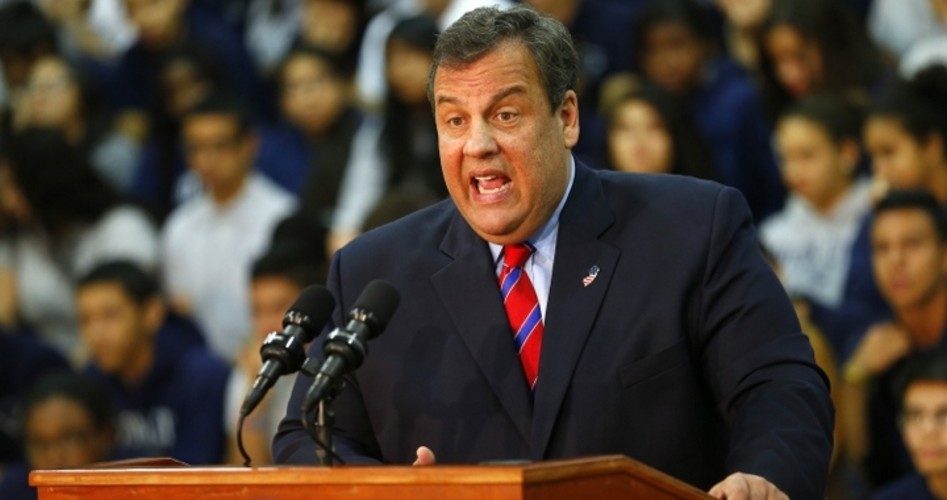
Newly reelected New Jersey Governor Chris Christie (shown) was busy over the weekend explaining that his focus is back on running New Jersey and not worrying about running for president in 2016. For instance, in an interview on ABC’s This Week, Christie said, “I know everybody’s going to be speculating about what may come in my future … but the fact is, I’m focused on being the governor of New Jersey and … the chairman of the Republican Governors Association.”
This was the message he repeated on three other Sunday programs. As Ralph Waldo Emerson once noted, “The louder he talked of his honor, the faster we counted our spoons.” His denials just didn’t ring true.
In the ABC interview, Christie began to speak of issues that are likely to resonate in 2016, such as ObamaCare:
Anybody who’s run anything in their lives could see this coming a mile away. That’s why we didn’t do a state-based health exchange. We didn’t do it because we could see that his whole program was going to be a problem.
He touted his election victory where, in a dark blue state, he was able to win as a Republican by 22 points, capturing a majority of female votes, half the Hispanic votes, and about 20 percent of the black votes. These are constituencies the Republican Party has coveted, and has been losing, for years.
He recounted his successes as governor, including “143,000 new private-sector jobs, reform[ing] pension and benefits, slow[ing] the growth of property taxes, cut[ting] business taxes $2.3 billion, [and reforming] teacher tenure.”
Matt Mowers, one of Christie’s key campaign managers, is now the executive director of the New Hampshire Republican Party, which it just so happens will host the first national primary for the 2016 election. Governor Christie has already been invited to the state to discuss policy issues and raise money for the party.
And those invitations are likely to continue and to increase in number and frequency. As newly installed head of the Republican Governors Association, Christie will be raising money, and raising his profile, all across the country, especially in those states where Republican candidates will be up for reelection. Christie has already said that he wants to support South Carolina Senator Lindsey Graham, who is being challenged by a conservative in his primary.
Denials to the contrary, it appears that Christie is running, and running hard, for 2016. As University of Virginia Professor Larry Sabato pointed out:
He’s not going to turn down this chance to be president. He’s running. It’s obvious he’s running. [His election-night speech was] less a talk about his second term in New Jersey than his first term as president.
The Republican establishment is already blessing Christie for his run in 2016. Ed Gillespie, the former chairman of the Republican National Committee, said,
We’ll be led back by our governors, and Chris Christie is now at the forefront of that resurgence. He’s proved that a conservative Republican can get votes from Hispanics and African-Americans, that a pro-life governor can get votes from women.
Democrats are already taking shots at Christie. The cover story with its not-so-flattering picture for the November 18 issue of Time magazine is entitled, “The Elephant in the Room,” referring obviously not only to Christie’s bulk but to his position, which is a source of embarrassment to many Republicans who see little to like in him.
Florida Rep. Debbie Wasserman Schultz, the chair of the Democratic National Committee, said Christie’s victory last Tuesday is attributable to nothing “more than a big personality and the aftermath of [Hurricane Sandy].” Wasserman pointed out that despite Christie’s so-called successes in New Jersey, the unemployment rate in the Garden State is 8.5 percent — a full percentage point higher than the national average.
And Wasserman’s communications director, Mo Elleithee, said he doesn’t think Christie’s momentum will carry over into a national campaign: “I don’t think that is transferable [either] to the party or to the other candidates, nor is it sustainable.” He called Christie’s sudden rise to the top of national political attention a “Giuliani boomlet,” adding, “Here’s a Republican who knows how to win in blue territory [due to] some sort of emotional connection to a national tragedy [Hurricane Sandy]…. It’s not transferable and it’s not sustainable.”
Christie’s actions as New Jersey’s governor in his first term give pause to conservatives. His embracing of President Obama following Hurricane Sandy just days before the 2012 presidential election hardly endeared him to those who see the president’s agenda as tyrannical and unconstitutional. Also, Christie signed into law a bill that would levy criminal penalties against parents and counselors if they try to change a young person’s sexual orientation or gender identity. He appointed Paula Gow as New Jersey’s attorney general, who favors abortion and gun confiscation and who refused to join in the lawsuit against ObamaCare by other states’ attorneys general. He let stand a ruling by a New Jersey superior court judge to permit homosexual marriage. He is, in the words of Gary Bauer, the president of American Values, “a Northeastern Republican [who will] have a hard time appealing to the GOP’s conservative base in the Midwest and the South.”
As the presidential campaign heats up, voters will dig more deeply into Christie’s background and will find — as did Governor Romney when he briefly considered naming him as his running mate in 2012 — an unsettling litany of shady behaviors that bodes ill for conservative support vital for a successful run for the White House. As authors John Heilemann and Mark Halperin reported in their recently released book on the 2012 presidential election, Double Down,
The [Romney campaign] vetters were stunned by the garish controversies lurking in the shadows of [Christie’s] record. There was a 2010 Department of Justice inspector general’s investigation of Christie’s spending patterns in his job prior to the governorship, which criticized him for being “the U.S. attorney who most often exceeded the government [travel expense] rate without adequate justification” and for offering “insufficient, inaccurate, or no justification” for stays at swank hotels such as the Four Seasons.
There was the fact that Christie worked as a lobbyist on behalf of the Securities Industry Association at a time when Bernie Madoff was a senior SIA official — and sought an exemption from New Jersey’s Consumer Fraud Act.
There was Christie’s decision to steer hefty government contracts to donors and political allies such as former Attorney General John Ashcroft, which sparked a congressional hearing.
There was a defamation lawsuit brought against Christie arising out of his successful 1994 run to oust an incumbent in a local Garden State race.
Then there was Todd Christie, the governor’s brother, who in 2008 agreed to a settlement of civil charges by the Securities and Exchange Commission in which he acknowledged making “hundreds of trades in which customers had been systematically overcharged.”
Despite Christie’s sudden rise to serious contention for the Republican Party’s presidential nomination in 2016, that election is still three years away. With prominence comes exposure. Christie’s political positions and background aren’t likely to withstand such exposure.
If Republicans are serious about finding someone to lead the country back to constitutional government, they will have to look elsewhere.
Photo of New Jersey Governor Chris Christie: AP Images
A graduate of Cornell University and a former investment advisor, Bob is a regular contributor to The New American magazine and blogs frequently at www.LightFromTheRight.com, primarily on economics and politics. He can be reached at [email protected]



